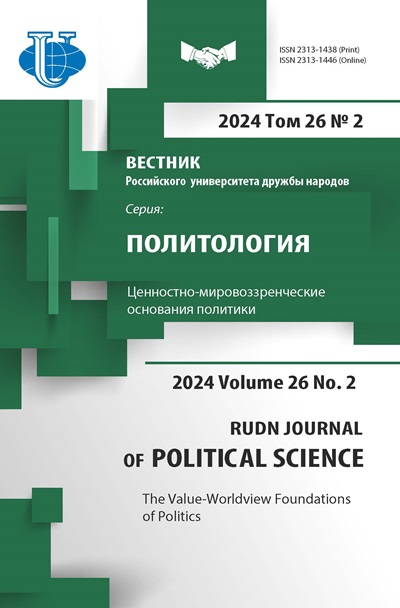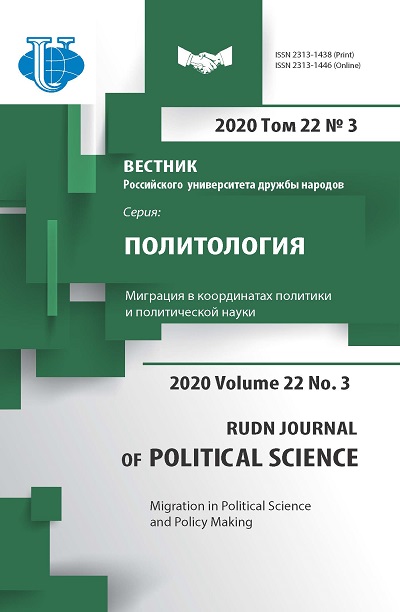Обработка естественного языка для анализа политического определения миграции в хорватском политическом дискурсе
- Авторы: Де Лука Г.1, Бек М.1
-
Учреждения:
- Российский университет дружбы народов
- Выпуск: Том 22, № 3 (2020)
- Страницы: 517-532
- Раздел: МИГРАЦИЯ И ПОЛИТИЧЕСКИЕ ТРАНСФОРМАЦИИ В ЕВРОПЕ
- URL: https://journals.rudn.ru/political-science/article/view/24288
- DOI: https://doi.org/10.22363/2313-1438-2020-22-3-517-532
Цитировать
Полный текст
Аннотация
Статья посвящена решению проблемы предвзятости аналитиков при проведении сравнительного анализа политического дискурса. Предлагаемое решение строится на анализе данных и использовании машинного обучения для обработки естественного языка. Кейс, который мы изучаем в связи с этой проблемой, относится к определению проблемы миграции в хорватском политическом дискурсе. Была разработана система машинного обучения, которая выявляет наиболее характерные черты хорватского политического дискурса в отношении миграции: эта система свободна от исследовательской субъективности. Исследование воспроизводимо, и при условии, что используется тот же набор данных и алгоритм, любой ученый должен прийти к тем же выводам. Этот результат был достигнут на основе сбора корпус-текстов из новостных материалов и пресс-релизов с веб-сайтов хорватских политических партий, представленных в парламенте, а также группу алгоритмов классификации машинного обучения для матриц Bag-of-Words, вычисленных из корпуса. Мы определили наиболее точную модель, классификатор дерева решений, которая была выбрана для дальнейшего анализа из-за ее точности и интерпретируемости. Нами также проанализированы правила принятия решений, определенные этим классификатором, которые затем были интерпретированы людьми, чтобы определить политические особенности текста, которые лучше всего предсказывают связь этого текста с темой миграции. В итоге подробно раскрыты три правила, идентифицированные с этой процедурой, которые мы считаем особенно интересными.
Об авторах
Габриэле Де Лука
Российский университет дружбы народов
Email: gabriele.deluca@mail.ru
аспирант кафедры сравнительной политологии Российская Федерация, 117198, Москва, ул. Миклухо-Маклая, 6
Марко Бек
Российский университет дружбы народов
Email: beck.marko@gmail.com
аспирант кафедры сравнительной политологии Российская Федерация, 117198, Москва, ул. Миклухо-Маклая, 6
Список литературы
- Geddes B. How the cases you choose affect the answers you get: Selection bias in comparative politics. Political analysis. 1990; (2): 131-150.
- Pittman J.A., Yang Zh., Yu S. Political Cycles and Analyst Bias. 2018. doi: 10.2139/ssrn.3262070
- Olsen M., Harvey L.G. Computers in intellectual history: lexical statistics and the analysis of political discourse. The Journal of Interdisciplinary History. 1988; 18 (3): 449-464.
- Gavrilova M.V. Political discourse as object of linguistic analysis. Polis. Political Studies. 2004; 3 (3): 127-139.
- Van Dijk T.A. What is political discourse analysis. Belgian journal of linguistics. 1997; 11 (1): 11-52.
- Collobert R., Weston J., Bottou L., Karlen M., Kavukcuoglu K., Kuksa P. Natural language processing (almost) from scratch. Journal of machine learning research. 2011; 12: 2493-2537.
- Bebić D. The role of the Internet in political communication and promoting political participation of citizens in Croatia: Internet election campaign 2007. Media Studies. 2011; 2: 3-4. (In Croat.).
- Ostojic R. A European Perspective of the Migration Crisis: Russian Experiences. Zagreb: Friedrich Ebert Foundation; 2016. (In Croat.).
- Sharich T. Escape from socialist Yugoslavia-illegal emigration from Croatia since 1945. by the early sixties of the 20th century. Migration and ethnic themes. 2015; (2): 195-220. (In Croat.).
- Žižić J. What is political emigration in Croatia? Political analysis. 2013; 4 (16): 61-64. (In Croat.).
- Sundhaussen H. Forced ethnic migration. Institut für Europäische Geschichte; 2010.
- Felberg T.R., Šarić L. In transit: Representations of migration on the Balkan route. Discourse analysis of Croatian and Serbian public broadcasters (RTS and HRT online). Journal of Language Aggression and Conflict. 2017; 5 (2): 227-250.
- Vezovnik A., Šarić L. Subjectless images: visualization of migrants in Croatian and Slovenian public broadcasters’ online news. Social Semiotics. 2020. 30 (2): 168-190.
- Šaric L., Felberg T.R. Representations of the 2015/2016 “migrant crisis” on the online portals of Croatian and Serbian public broadcasters. Migration and Media: Discourses about identities in crisis. 2019; 81: 203.
- Ragazzi F., Balalovska K. Diaspora politics and post-territorial citizenship in Croatia, Serbia and Macedonia. CITSEE Working Paper Series. 2011; 18.
- Ragazzi F. The Croatian ‘diaspora politics’ of the 1990s: nationalism unbound? Croatian ‘Diaspora Politics’ of the 1990s: Nationalism Unbound? In: U. Brunnbauer (ed.). Transnational Societies, Transterritorial Politics: Migrations in the (Post-) Yugoslav Region, 19th-21st Century. 2009.
- Knezović S., Grošinić M. Migration trends in Croatia. Zagreb: Hanns-Seidel-Stviftung, Institute of development and international relations, Kolor Klinika; 2017: 1-39.
- Rovny J. The other “other”: Party responses to immigration in Eastern Europe. Comparative European Politics. 2014; 12 (6): 637-662. doi: 10.1057/cep.2014.25
- Gregurović M., Kuti S., Župarić-Iljić D. Attitudes towards immigrant workers and asylum seekers in eastern Croatia: dimensions, determinants and differences. Migration and ethnic themes. 2016; 32 (1): 91-122.
- Nadkarni P. M., Ohno-Machado L., Chapman W.W. Natural language processing: an introduction. Journal of the American Medical Informatics Association. 2011; 18 (5): 544-551.
- Ljubešić N., Boras D., Kubelka O. Retrieving information in Croatian: Building a simple and efficient rule-based stemmer. 2007.
- Lipton Z.C., Elkan C., Naryanaswamy B. Optimal thresholding of classifiers to maximize F1 measure. Joint European Conference on Machine Learning and Knowledge Discovery in Databases. Berlin: Springer; 2014: 225-239.
- Assembly U.G. Global Compact for Safe, Orderly and Regular Migration. International Journal of Refugee Law. 2018; 30 (4): 774-816.
















